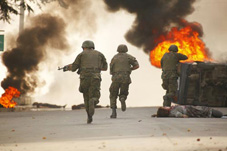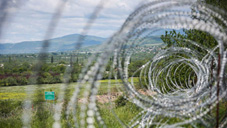Ombudsman: Thousands Have Been Detained Illegally by Russia-Controlled Guards
By Gvantsa Gabekhadze
Thursday, August 9


“Cases of deprivation of life have also occurred on the occupation lines,” Lomjaria says in a special statement on the 10th anniversary of the Russia-Georgia war which made two Georgian regions of Abkhazia and Tskhinvali controlled entirely by Russia.
Lomjaria says that the conflicts in the 90s and 2008 affected more than half a million people.
“278, 103 out of them became internally displaced persons. 20 percent of the territory of Georgia is occupied. These figures indicate the challenges faced by our country and the huge responsibility of the central government,” the ombudsman said.
She says that the general analysis of the IDPs' rights situation shows that their main problems remain the same over the years.
“58 percent of the registered IDPs are still waiting for shelter. In some facilities, IDPs have to live in severe conditions; former collective centers have been poorly rehabilitated and repaired; the social and economic situation remains a challenge.
“To realize the rights of internally displaced persons, the Public Defender considers that the following is neccesary: 1. Priority should be given to resettlement of IDPs from the facilities that threaten their lives or health; 2. A model focused on IDPs’ needs should be developed,” Lomjaria said.
Lomjaria states that the rights situation of people living along the occupation lines has worsened after 2008.
“The 350 km-long occupation line of the Tskhinvali region is controlled by 1 200 border guards of the Russian Federation, and 1 500 border guards control the 145 km-long dividing line of Abkhazia. Erection of barbed wire fences directly damaged more than 50 villages of Shida Kartli and Samegrelo-Zemo Svaneti regions on the Georgian-controlled territory,” she stated.
Lomjaria says that locals daily face unlawful detentions, military exercises at the bases of the Russian Federation, the problem of drinking and irrigation water, as well as the poverty caused by the loss of agricultural lands as a result of the occupation.
“In 2016-2018, two Georgian citizens, Giga Otkhozoria and Archil Tatunashvili, became victims of illegal actions of de facto law-enforcement agencies when they were passing checkpoints fully controlled by the border troops of the Russian Federation. Therefore, the Russian Federation, as a country exercising effective control on the occupied regions, is directly responsible for the violation of the Georgian citizens’ right to life,” Lomjaria said.
Lomjaria stated that she welcomes any initiative of the Government of Georgia aimed at protecting the rights of the population living in the occupied territories and building trust between the communities split by conflicts. To achieve this goal, she believes, it is necessary to:
Allocate additional funds to equip medical and educational institutions operating on the occupied territories, as well as to help pharmaceutical and academic personnel; provide scholarship or other encouraging programs for students living in the occupied territories
Resume funding for outpatient diagnostics within the framework of the Referral Service State Program for patients from the occupied territories, while persons having documents confirming Georgian citizenship and living in the occupied territories should not face problems while enjoying the referral program
Develop a social assistance mechanism for persons with disabilities living in the occupied territories, as well as lonely older adults, large families, etc.
The War in Abkhazia from 1992 to 1993 was fought between Georgian government forces for the most part, and Abkhaz separatist forces, Russian armed forces and North Caucasian militants. The separatists received support from thousands of North Caucasus and Cossack militants and the Russian troops stationed in and near Abkhazia.
Between 13,000 to 20,000 ethnic Georgians and approximately 3,000 Abkhaz have been reported killed, more than 250,000 Georgians became internally displaced, or refugees and about 2,000 are considered missing.
Among the missing, about 1,500 are ethnic Georgians, up to 200 are ethnic Abkhazians and about 100 are ethnic Ossetians.
101 bodies have been identified and transported to Georgia over the course of last years.
The Russia-Georgia 2008 War was a war between Georgia, Russia and the Russian-backed self-proclaimed republics of South Ossetia and Abkhazia.
The war displaced 192,000 people and while many returned to their homes after the war, 20,272 people, mostly ethnic Georgians, remained displaced.
35 Georgians and 6 Ossetians remain missing since the war.
Russia, Venezuela, Nicaragua, Nauru, and Syria have recognized Abkhazia and Tskhinvali as independent states since the 2008 war. The rest of the international community says the regions are integral parts of Georgia.
